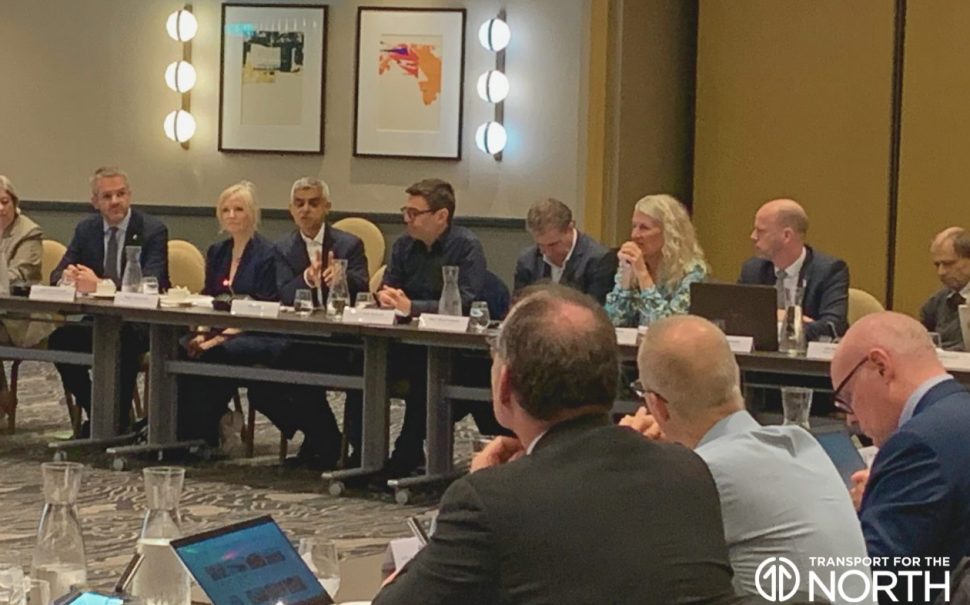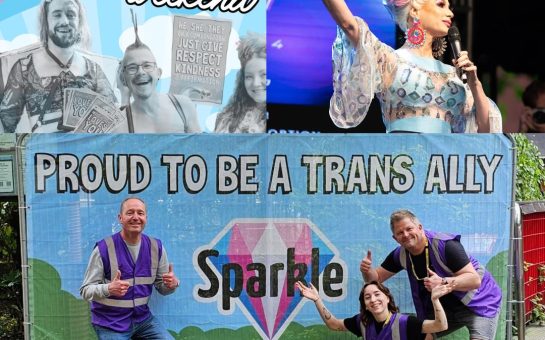The Mayor of London Sadiq Khan made an unexpected appearance in a Northern transport meeting yesterday as concerns grow over rumoured changes to HS2’s proposed route.
At a scheduled Transport for the North (TfN) gathering in Leeds, the Labour figurehead joined Northern-based mayoral colleagues in a show of support as speculation surrounding the cancellation of the planned Birmingham to Manchester leg of the rail project became palpable.
Before the meeting, alongside northern equivalents Andy Burnham, Oliver Coppard, Steve Rotheram, and Tracy Brabin, Mr Khan signed a letter to Prime Minister Rishi Sunak in a plea to prevent Whitehall from abandoning the development of a high-speed rail network in the region following a significant rise in costs.
According to government leaks, Downing Street is planning to both axe the second leg of HS2 – which is set to link Birmingham and Manchester’s rail lines – and move London-based arrivals to Old Oak Common in Ealing from the original destination of Euston station.
Such a decision would follow the 2021 announcement that the project’s extension between Birmingham and Leeds would no longer go ahead.
Speaking before the board of TfN – a sub-regional body which aims to help transform travel infrastructure in the area – Mr Khan related the worries held by northern leaders to the damage that could be caused in the South East if these rumours are proven to be true.
Mr Khan said: “Take from me my full support in relation to the impact on you if (HS2) doesn’t proceed beyond Birmingham.
“Euston Station is currently a construction site. Over the last few years, we’ve had homes that have been demolished, businesses destroyed and communities feeling let down by temporary construction. The idea that the end terminal in perpetuity (would be) six miles west in Old Oak Common is just staggering for a variety of reasons.
“There’s only one line that connects Old Oak Common with London public transport and that’s the Elizabeth Line. To get from Birmingham to the centre of London on HS2 will take longer than the current west coast mainline because it doesn’t go to the centre, it goes six miles west. You’d have to change twice to get to the centre of our city.
“I can’t think of… a better example of public policy failure and a worst example of squandering tax payers’ money than if the plans that are being leaked are proven true in relation to HS2 not happening north of Birmingham and not happening in the centre of London.
“The success of the north is crucial to London’s success.
“We’re with you and anything we can do to support you we will do. We’re from different regions as mayors, but I think we speak as one voice on our commitment (to HS2).”
The Government’s Culture Secretary Lucy Frazer responded to these statements by saying that the Chancellor of the Exchequer is “looking at a whole range of projects to make sure they are value for money”.
If the Govt is truly committed to levelling up in the Midlands and the North, it must continue with the original plan for HS2 to operate from Euston to Birmingham and Manchester.@AndyBurnhamGM, @MayorOfWY, @SouthYorksMayor @LCRMayor & I have issued a joint statement to the PM.
— Mayor of London, Sadiq Khan (@MayorofLondon) September 27, 2023
HS2 and the Northern Powerhouse Rail project
Another issue brought before the gathered board concerned a resolution to reaffirm TfN’s commitment to delivering both HS2 in the region and the Northern Powerhouse Rail (NPR) project.
An amendment floated for this proposal was for the group to expressly state its prioritisation of the latter scheme as a result of recent developments and in an attempt to limit any damage that may be caused to the North’s interests if the expected cancellation becomes reality.
The NPR scheme aims to introduce an improved train service between Liverpool, Manchester, and Leeds through the installation of an underground station at Manchester Piccadilly, as well as the use of planned enhancements to these lines following HS2’s introduction.
Mayor of Greater Manchester Andy Burnham represented the consensus of those gathered by rejecting any such “choice” between the two projects, while reinforcing the view that both schemes should be protected, saying that they are equally expedient for the North to progress from its present “Victorian” rail lines:
“(The necessary) capacity comes through the new infrastructure north of Birmingham, that is the heart of NPR. (Only through that) will the rail lines of Northern England acceptable for future generations. That is why we mustn’t be forced to make a choice at this stage (between HS2 and NPR).
“This has fundamental ramifications for the size of the economy in North England for the rest of this century. If we climb down and accept second best, we will be failing future generations.
“It’s been 10 years since (former Chancellor of the Exchequer) George Osbourne came to Manchester and made his famous Northern Powerhouse speech. How much of that has been delivered?
“This is what’s at stake here. We can’t anymore live in a country where big promises are made and then people walk away from them. If they are made, they should be delivered. The North of England deserves nothing less.”
TransPennine Express’s Nova 3s an “appalling” train
Yesterday’s meeting also bore witness to a presentation by Robin Gisby, the Chief Executive of the Government’s Operator of Last Resort operating company, on the recovery plan currently in place for the rehabilitation of TransPennine Trains.
The rail service entered the remit of the Operator of Last Resort in late May, following a high level of cancellations and delays.
Appearing for the first time before the TfN board, Mr Gisby used this opportunity to address several discussion points surrounding the train operators – including its proposed reduced schedule during the upcoming Christmas period, as well as the withdrawal of its ‘state of the art’ Nova 3 trains.
In relation to the former, several services are to be halted from December 2023 onwards as TransPennine Express takes a “step back” to offer certainty to commuters.
Consequently, Mr Gisby hopes that this will lead to more journeys travelling on time, free from the perils of being cancelled or subjected to ‘short notice rescheduling’.
It is also expected that services will be returned to an increased schedule by December 2024 at the latest.
Concerning the latter issue, the senior management representative was rather more direct about his reservations.
It was recently announced by TransPennine Express that its Nova 3 trains would be withdrawn due to a lack of adequate driver training, which had resulted in services being disrupted or even cancelled due to the inoperable nature of the half diesel, half electric vehicles.
During the meeting, Mr Gisby made his opinion on their condition clear by saying:
“I’ve got an issue with the Nova 3s and the big stonking diesel at the front. It’s an appalling train (and) it shouldn’t be running on this network. There are all kinds of (issues), even if they are a comfortable ride.”
According to his own reports, the trains are expected to cost the rail operators £30 million – alongside the likely environmental damage caused by their dependence on fossil fuels.
Several in attendance – including Mr Burnham and his mayoral colleagues – expressed their concern as to whether the trains’ removal would be a permanent decision, thus leading to an effective “levelling down” of infrastructure across rail lines in the north.
In response, the OLR head stated that the future use of these vehicles was uncertain, but that other “rolling stock” is set to be introduced over the coming years to help enhance services available to customers.
Another announcement made by Mr Gisby was the expectation that TransPennine Trains will be returned to its former state by December 2024, with more to be offered in the form of “inter-urban connectivity” by the service following its long stint under OLR governance.
Featured image credit: Transport for the North



